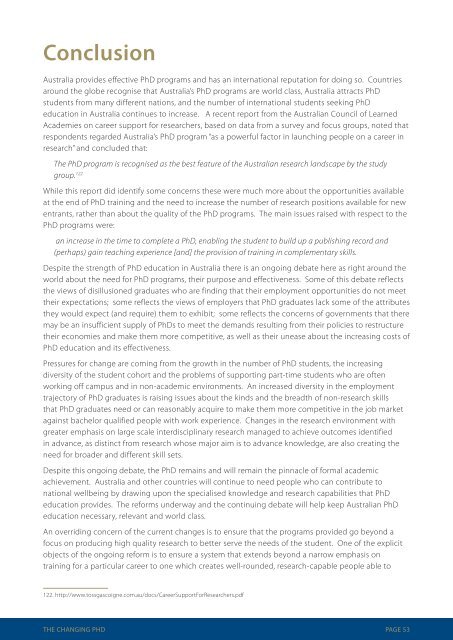the-changing-phd_final
the-changing-phd_final
the-changing-phd_final
You also want an ePaper? Increase the reach of your titles
YUMPU automatically turns print PDFs into web optimized ePapers that Google loves.
Conclusion<br />
Australia provides effective PhD programs and has an international reputation for doing so. Countries<br />
around <strong>the</strong> globe recognise that Australia’s PhD programs are world class, Australia attracts PhD<br />
students from many different nations, and <strong>the</strong> number of international students seeking PhD<br />
education in Australia continues to increase. A recent report from <strong>the</strong> Australian Council of Learned<br />
Academies on career support for researchers, based on data from a survey and focus groups, noted that<br />
respondents regarded Australia’s PhD program “as a powerful factor in launching people on a career in<br />
research” and concluded that:<br />
The PhD program is recognised as <strong>the</strong> best feature of <strong>the</strong> Australian research landscape by <strong>the</strong> study<br />
group. 122<br />
While this report did identify some concerns <strong>the</strong>se were much more about <strong>the</strong> opportunities available<br />
at <strong>the</strong> end of PhD training and <strong>the</strong> need to increase <strong>the</strong> number of research positions available for new<br />
entrants, ra<strong>the</strong>r than about <strong>the</strong> quality of <strong>the</strong> PhD programs. The main issues raised with respect to <strong>the</strong><br />
PhD programs were:<br />
an increase in <strong>the</strong> time to complete a PhD, enabling <strong>the</strong> student to build up a publishing record and<br />
(perhaps) gain teaching experience [and] <strong>the</strong> provision of training in complementary skills.<br />
Despite <strong>the</strong> strength of PhD education in Australia <strong>the</strong>re is an ongoing debate here as right around <strong>the</strong><br />
world about <strong>the</strong> need for PhD programs, <strong>the</strong>ir purpose and effectiveness. Some of this debate reflects<br />
<strong>the</strong> views of disillusioned graduates who are finding that <strong>the</strong>ir employment opportunities do not meet<br />
<strong>the</strong>ir expectations; some reflects <strong>the</strong> views of employers that PhD graduates lack some of <strong>the</strong> attributes<br />
<strong>the</strong>y would expect (and require) <strong>the</strong>m to exhibit; some reflects <strong>the</strong> concerns of governments that <strong>the</strong>re<br />
may be an insufficient supply of PhDs to meet <strong>the</strong> demands resulting from <strong>the</strong>ir policies to restructure<br />
<strong>the</strong>ir economies and make <strong>the</strong>m more competitive, as well as <strong>the</strong>ir unease about <strong>the</strong> increasing costs of<br />
PhD education and its effectiveness.<br />
Pressures for change are coming from <strong>the</strong> growth in <strong>the</strong> number of PhD students, <strong>the</strong> increasing<br />
diversity of <strong>the</strong> student cohort and <strong>the</strong> problems of supporting part-time students who are often<br />
working off campus and in non-academic environments. An increased diversity in <strong>the</strong> employment<br />
trajectory of PhD graduates is raising issues about <strong>the</strong> kinds and <strong>the</strong> breadth of non-research skills<br />
that PhD graduates need or can reasonably acquire to make <strong>the</strong>m more competitive in <strong>the</strong> job market<br />
against bachelor qualified people with work experience. Changes in <strong>the</strong> research environment with<br />
greater emphasis on large scale interdisciplinary research managed to achieve outcomes identified<br />
in advance, as distinct from research whose major aim is to advance knowledge, are also creating <strong>the</strong><br />
need for broader and different skill sets.<br />
Despite this ongoing debate, <strong>the</strong> PhD remains and will remain <strong>the</strong> pinnacle of formal academic<br />
achievement. Australia and o<strong>the</strong>r countries will continue to need people who can contribute to<br />
national wellbeing by drawing upon <strong>the</strong> specialised knowledge and research capabilities that PhD<br />
education provides. The reforms underway and <strong>the</strong> continuing debate will help keep Australian PhD<br />
education necessary, relevant and world class.<br />
An overriding concern of <strong>the</strong> current changes is to ensure that <strong>the</strong> programs provided go beyond a<br />
focus on producing high quality research to better serve <strong>the</strong> needs of <strong>the</strong> student. One of <strong>the</strong> explicit<br />
objects of <strong>the</strong> ongoing reform is to ensure a system that extends beyond a narrow emphasis on<br />
training for a particular career to one which creates well-rounded, research-capable people able to<br />
122. http://www.tossgascoigne.com.au/docs/CareerSupportForResearchers.pdf<br />
THE CHANGING PHD PAGE 53


